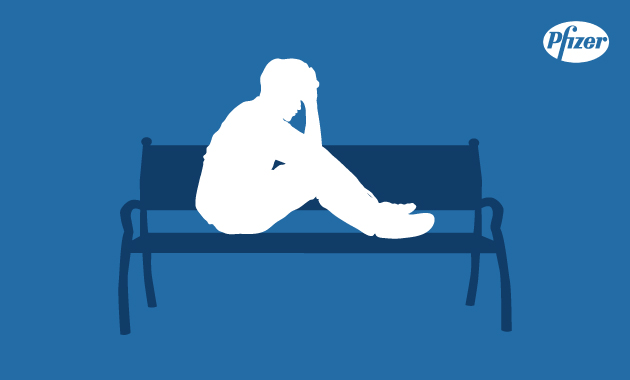
According to a 2016 report by Bengaluru based National Institute of Mental Health and Neuroscience (NIMHANS), one in every 20 Indians suffers from some or the other form of depression. Despite a lot of social stigma, in recent years there has been some effort towards creating awareness about this mood disorder by the media. However, not much is spoken about its role in erectile dysfunction (ED). Find out whether depression can cause male sexual dysfunction, mainly diminished libido and ED.
How does depression cause ED?
A study published in the clinical journal American Family Physicians found that around 70% of people with depression who were not on medication had significant loss of sexual interest. While some believe that ED is a physical problem and not psychological, experts state that it can be both physical and psychological.
Sexual dysfunction is a common symptom of depression. Decreased libido in both the sexes is mostly reported but problems with arousal, vaginal dryness in women, erectile dysfunction in men and absent or delayed orgasm in both are also commonly seen.
Here’s what happens when a person is depressed:
Brain chemicals and sex hormones: The urge to have sex and achieve an erection happens in the brain. During arousal, the chemicals in the brain (neurotransmitters) send signals to the nerves in the penis. This causes the release of nitric oxide, a chemical which is responsible for erection.
Sexual behaviour and penile erection are controlled by the limbic system (brain). The chemical imbalances that occur when depressed can reduce a person’s ability to experience pleasure, both physical and emotional, which affects the sex drive and erection.
Sexual urge and feelings: When a person is clinically depressed and does not feel happy or good, the thought and idea of having intercourse is not enticing. This also lowers the frequency of intercourse and the quality of sex life.
Most people who suffer from clinical depression, whether acute or chronic, experience lack of desire at a physical, emotional and sexual level. Since the urge to have sex is lost most people do not experience an erection.
Also, depression in men can affect morning erections or nocturnal penile tumescence (NPT) which is a measure of erectile capacity.
Role of antidepressants: Sometimes, even antidepressants can lead to ED. Some Selective Serotonin Reuptake Inhibitors (SSRIs) and Serotonin Norepinephrine Reuptake Inhibitors (SNRIs) can lead to sexual problems. This is because antidepressants improve mood and other emotional symptoms by altering the function of neurotransmitters. Use of such antidepressants can affect nerve pathways that help regulate sexual response leading to erectile issues and other sexual problems.
However, not all medications used to treat depression are responsible for sexual dysfunction.
Suffer from depression and ED: What to do?
In most cases, a person suffering from depression experiences the symptoms such as low self-esteem, anxiety, and guilt, which can cause ED.
As every patient with depression has a different sexual problem, it is wise to not depend on random search results but consult a psychiatrist, who is trained to diagnose clinical depression and also treat ED. Remember, both depression and ED are treatable conditions, so do not wait until the symptoms worsen, instead seek help as soon as possible to lead a healthy and happy life.
PP-VIA-IND-0111 22/05/2018
References:
1. National Mental Health Survey of India (2015 – 2016). Available from: http://www.nimhans.ac.in/sites/default/files/u197/National%20Mental%20Health%20Survey%20-2015-16%20Summary_0.pdf
2. Phillips RL Jr, Slaughter JR. Depression and sexual desire. Am Fam Physician. Aug 15;62(4):782-6. Available from: https://www.aafp.org/afp/2000/0815/p782.html#afp20000815p782-b4
3. Wang W. [Psychological factors involved in erectile dysfunction]. Zhonghua Nan Ke Xue. 2011 Dec;17(12):1146-51. Available from: https://www.ncbi.nlm.nih.gov/pubmed/22235687
4. Kennedy SH, Rizvi S. Sexual dysfunction, depression, and the impact of antidepressants. J Clin Psychopharmacol. 2009 Apr;29(2):157-64. Available from: https://www.ncbi.nlm.nih.gov/pubmed/19512977
5. Dean RC, Lue TF. Physiology of penile erection and pathophysiology of erectile dysfunction. Urol Clin North Am. 2005 Nov;32(4):379-95, v. Review. Available from: https://www.ncbi.nlm.nih.gov/pmc/articles/PMC1351051/
6. Burnett AL. The role of nitric oxide in erectile dysfunction: implications for medical therapy. J Clin Hypertens (Greenwich). 2006 Dec;8(12 Suppl 4):53-62. Available from: https://www.ncbi.nlm.nih.gov/pubmed/17170606
7. Meisler AW, Carey MP. Depressed affect and male sexual arousal. Arch SexBehav. 1991 Dec;20(6):541-54. Available from: https://www.ncbi.nlm.nih.gov/pubmed/1768221
8. Thase ME, Reynolds CF 3rd, Jennings JR, Frank E, Howell JR, Houck PR, Berman S, Kupfer DJ. Nocturnal penile tumescence is diminished in depressed men. Biol Psychiatry. 1988 May;24(1):33-46. Available from: https://www.ncbi.nlm.nih.gov/pubmed/3370276
9. Higgins A, Nash M, Lynch AM. Antidepressant-associated sexual dysfunction: impact, effects, and treatment. Drug Healthc Patient Saf. 2010;2:141-50. Available from: https://www.ncbi.nlm.nih.gov/pmc/articles/PMC3108697/
10. Assalian P. Psychological and interpersonal dimensions of sexual function and dysfunction. Arab J Urol. 2013 Sep;11(3):217-21. Available from: https://www.ncbi.nlm.nih.gov/pmc/articles/PMC4442989/